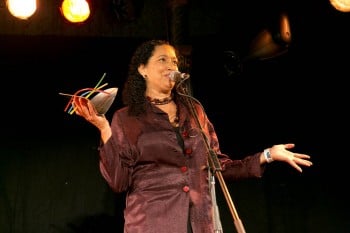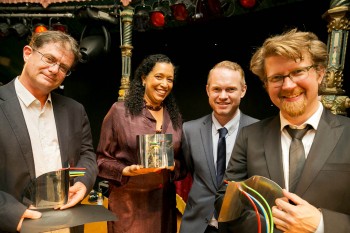Tracing twenty-two years of producing black theatre in Victoria is no mean feat
Aussie theatre’s Dione Joseph caught up with Ilbijerri’s Artistic Director, Rachael Maza, to explore what makes bold, black and brilliant theatre.

Ilbijerri, a Woiworrung word meaning ‘come together for ceremony’, is our State Indigenous Theatre Company and a principal source of contemporary Indigenous theatre for the people in Victoria.
Recently, the hard work and years of commitment and effort were recognized with the company being awarded the prestigious Sidney Myer Award.
“We are at very unique time in the world and especially in Australia. As a culture we have a growing appetite to hear our Indigenous stories, and as an industry it is our responsibility to step into that and make sure those voices are heard” says Rachael Maza, Ilbijerri’s Artistic Director.
Few would argue against the power of theatre as a political tool and, borne out of struggles for justice and fundamental human rights, the legacy of the National Black theatre established by Bob Maza and Jack Charles continues to live on.
“At that time theatre was one of the only means to educate”, explains Maza. “To ensure that issues were no longer kept hidden or secret but were openly interrogated in the public domain. For those who were denied the opportunity to have a political opinion theatre became the vehicle for expression and education.”
But these shifts, both social and economic, as well as political, haven’t come to a grinding halt. In fact there is often the danger that in these situations it is easy to be seduced by the thought that the tide has turned. The movements of the late 70s and 80s have paved the way for unprecedented achievements and recognition and these efforts continue to inspire people today.
“Our generation has reaped massive benefits thanks to … [the efforts of the 70s and 80s] … and really it wasn’t all that long ago,” recalls Maza, “Politics was given a wake-up call back then and it reflected the changes of us as a country, but also the world; we were getting a mighty shake up.”
[pull_left]We are very proud and humbled to be the recipients of such a prestigious award and it encourages us to keep taking risks. We need to keep moving forward and challenging ourselves, because to take risks epitomizes the strength and the spirit of our people[/pull_left]
However, the state of affairs today is still very complex. Across a number of different circumstances Aboriginal & Torres Strait Islander people are forced to ask themselves: “Having acknowledged the achievements of our past how do we continue to move forward?”
“The options might be obvious, on the one hand we’re here now so get yourself a job, a mortgage, just fit in,” says Maza. “Or go back to your culture and heritage and re-create what we think is a version of authentic Aboriginality. But neither fail to satisfy fully”
Binary options clearly aren’t the solution. “Our core is our land and culture, and our sense of community and family, but it is how we maintain our cultural integrity, without compromising who we are, our past and what we believe, that is the key motivator today”.
The theatre that Ilbijerri is committed to developing reflects just that.
“Negative stereotypes continue to exist” says Maza. “Deconstructing those stereotypes and giving us a voice and humanity that is three-dimensional is our mission. We constantly battle against the notion of Indigenous people as exotic, as the ‘dying race’. Some people still think that culturally we are slowly fading away and will eventually be totally assimilated into white culture; that is merely a mutation of the Darwinian theory and unfortunately it continues to be dominant.”
But battling against stereotypes is only one facet of Ilbijerri’s repertoire and their latest productions, including Jack Charles vs the Crown, Foley and Corranderk, reflect the vibrancy and resilience of Indigenous Australians.
“Despite the horrendous attempts to keep us down, to keep our people in slavery, and despite all of those obstacles which are continually thrown our way, we are a proud people, we are not victims, we are people with the capacity to rise again and again and believe that we still have hope.”

Indigenous theatre is an art form; it is not exclusive nor is it unyielding. “If the work is told with absolute integrity to the artist, the storyteller and of course to the art itself, then it steps into the realm of the universal; anyone can ‘get it’ emphasizes Maza. “This is an opportunity to speak, of course, to your own mob, but also to a wider audience and, who knows, [maybe] they gain an understanding of a perspective and world view that they never had before.”
Armed with accolades and increasing recognition from all quarters, Ilbijerri are making every effort to ensure that their work continues to uphold the values of Indigenous people and respond to the moment.
As Maza concludes:
“We are very proud and humbled to be the recipients of such a prestigious award and it encourages us to keep taking risks. We need to keep moving forward and challenging ourselves, because to take risks epitomizes the strength and the spirit of our people.”


Pingback:Rachael Maza - An Interview - dione joseph